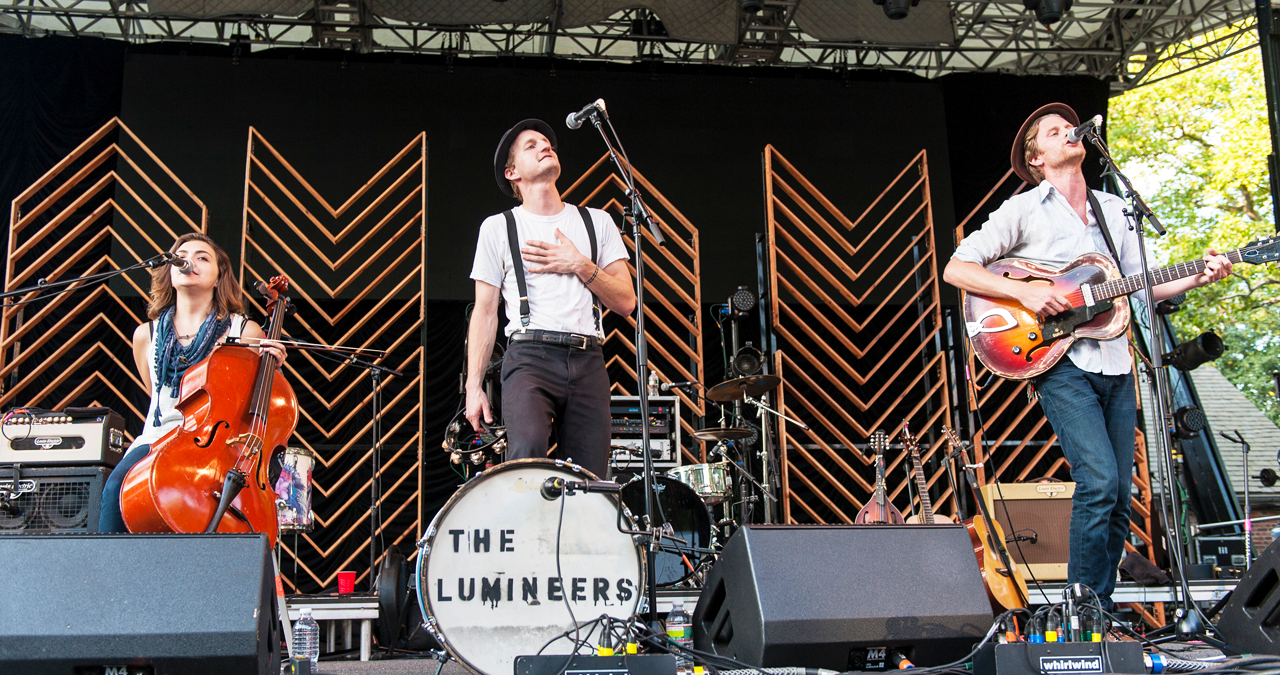“It’s a sad song, but so many people tell us they had it played at their wedding”: How a dejected indie folk gem became a wedding song staple
You couldn’t get away from the Lumineers’ Ho Hey when it was released back in 2012, but few people knew that the life-affirming anthem was actually a pained reflection on multiple heartbreaks

The city that never sleeps was habitually snoozing on the emerging talents of New Jersey-born songsmith, Wesley Schultz. Having formed a duo with fellow New Jersey native Jeremiah Fraites in 2005, the budding indie/folk pairing had been hammering the NY bar circuit, interspersing a majority covers-based set with a handful of sparkling originals.
Frustratingly the regular small venue patrons had little interest in anything they didn’t recognise.
“We used to play bars all the time and [play] mostly cover songs,” Schultz told Bedroom Disco. “Our [first] band name was Free Beer. We’d pepper in some of our own music.”
Though Schultz was conscious that his songwriting was certainly improving, the beer-fuelled audiences to which the pair played were stubborn in their disinterest.
“Whenever we’d do a Bob Dylan or Coldplay song, all ears were on us,” recalled the percussion and piano-helming Fraites in the same interview. “But when Wes would say, ‘Here’s an original,’ everyone would flee for a cigarette break or to play billiards.”
“Bars would let you play because they wanted your friends to buy drinks,” Wesley elaborated in a Guardian interview, “But, then they’d kick everybody out to get the next group in.”
It wasn’t just the lack of recognition that was gnawing at Wesley and Jeremiah.
Despite working two or often three jobs (including a stint where Schultz worked as a barista) the inordinately high cost of living in New York was rendering their hopes to lead a bohemian, creatively-oriented lifestyle untenable.
Every day came another bill. And, by night, another indifferent crowd.
After years of hitting the same brick wall, there was a growing feeling that success was well and truly out of their reach.

Compounding this frustration was a painful break-up with a girl that Wesley had been dating.
Devastated by the split, it increasingly seemed like fate was all but screaming at the forlorn songsmith that now was the time to cut his losses, and get out of town.
Making a pact to not be defeated, and to continue striving to make music, the pair moved to the more affordable Denver, Colorado.
Touring around Colorado under their collective forenames as Wesley Jeremiah, the beleaguered two would often take laborious 14-hour drives back to those same dispiriting bars of Brooklyn, in the hopes that eventually, their growing stable of original songs would catch the eye of potential fans or industry types.
Sustaining himself financially, Schultz naturally, had a bee in his bonnet toward those that could easily flounce around the NY indie scene without a care in the world, propped up by the parental pocket.
“[In New York] I found a lot of trust fund kids and not a lot of real artists. I wanted to tour and play music, and a lot of these people were like, ‘Oh, I’m in six bands’. And I’m like, ‘Six bands? I’m barely able to keep up with one, and I really care about this!’
“To them, it was almost like a fashion statement to be in a band, More than it was their life,” Wesley continued in an interview with Songwriting Magazine.
Wesley channelled his bitterness into a new song. Ironically, it would be this very song that would catapult the group, now going by the name the Lumineers, to the attention of millions.
“I’ve been trying to do it right, I’ve been living a lonely life,” began, what was on the surface, a spritely song. Propelled by buoyant and bright C and F chords, Wesley’s lyric riffed between his ongoing struggle to make it as a musician, and the agony of his recent breakup.
"I belong with you, you belong with me
You're my sweetheart"
The positive tone of the music - and its cheerful, almost stylised chorus - masked the pain which underpinned the lyrics.
“The opening lines are me trying to convince myself that striving to become a successful musician was a noble pursuit,” Wesley told the Guardian. “I had been ‘trying to do it right’ and ‘living a lonely life’. The hook is pure defiance: you might have broken up with me but 'I belong with you, you belong with me.'"
Though fuelled by dejection, the bouncy tune was an obvious winner to all who heard it. An instant head-turner and mood-lifter, the singalong energy of the chorus was infectious and suitably audience-stimulating.
By now, the pair had enlisted the third member of the Lumineers’ core line-up, classically-trained cellist Neyla Pekarek, via a Craigslist ad.
“I was living with my parents and kind of just looking for something to do. I thought it would be a fun way to pass my time until I found something full time to do,” the classically-trained Neyla told Her Life Magazine. Now sporting a virtuoso cellist, and sublime backing vocalist, the Lumineers’ repertoire immediately got a boost.

The group’s then-newest song, which had been dubbed ‘Ho Hey’, was becoming a clear bright spot in their set.
But those characteristic shouts of ‘Ho’ and ‘Hey’ that were interspersed throughout the song were initially planted, almost resentfully, as a way of grabbing the attention of bored-looking gig patrons.
“Shouting, ‘Ho, hey!’, from the stage got people’s attention. We were shouting to be heard. Then, suddenly, everyone started listening,” Schultz told American Songwriter.
The shouts, which delighted in their provocation of the Brooklyn scenesters, also underlined the strain of defiance within the song.
"That song was an effort to get under people's skin at shows in Brooklyn, where everyone is pretty indifferent," Wesley continued in his American Songwriter interview. “I figured if we could punctuate it with shouts we might get someone's attention."
Alongside other strong material, including future single Stubborn Love, Flowers in Your Hair and the superb Submarines, the Lumineers had established enough momentum to record a debut album.
Having signed a management deal with Onto Entertainment, the three also had the financial clout needed to cut their first studio album. Working with producer Ryan Hadlock at Seattle’s Bear Creek Studio, they set to capture eleven tracks for what would be a self-titled LP.
Convinced that Ho Hey could potentially be the album’s lead single, the three gave it a shot in the studio - but struggled to bottle the ineffable communal magic of the song which had worked so well when playing it on the road.
“We tried recording it over and over, but it took an incredibly long time to get it sounding how it felt live,” recollected Schultz in his interview with Songwriting Magazine.
Fraites went into more detail in his interview with The Guardian, stating that “after we got management, we recorded a studio version in some woods north of Seattle, trying to recreate the sound of my boots stomping on a wooden stage, which we had liked at an open mic.
"There’s no bass on Ho Hey," Fraites continues. "It’s a cello pizzicato which we made much louder. The song is like Italian cooking - there are so few elements that every ingredient needs to be perfect.”

To finish off the song, and the surrounding album, the band turned to Kevin Augunas at his Fairfax Recording Studio in Los Angeles to mix and polish the record (previously known as the legendary Sound City).
“[Kevin] pointed out that a lot of our favourite records had been recorded without using a click track, or metronome, so suggested we try that. Suddenly it worked. The bit where it goes ‘one, two, three’ is a cue for us to slightly speed up.”
Heralded by its placement in an episode of US comedy/drama TV show Hart of Dixie in December 2011, Ho Hey was released as a single on the label Dualtone on June 4th, 2012, preceded by a music video.
Want all the hottest music and gear news, reviews, deals, features and more, direct to your inbox? Sign up here.
The video captured the weatherbeaten, ramshackle world of the Lumineers and the community spirit of their shows. With regular rotation on alternative music television, the video was a key ingredient in the song's irrepressible cultural traction.
Suddenly, it was appearing in advertising. Success seemed, finally, to be beckoning, a mere seven years after the group first started.
Raising a smile in nearly all who heard it (all of whom oblivious to real story of its origin) Ho Hey was a surefire hit in the making.
Dubbing it ‘the best song of 2012’, enamoured radio DJ John Richards at Seattle’s KEXP-FM began playing Ho Hey religiously. Even more people were reeled in.
Before long, Ho Hey had reached the very top of the Billboard Rock Songs chart and number 3 in the Billboard Hot 100. A quite stunning achievement for a debut single.
Finally, Schultz had validation, following the long struggle for success that had for so long eluded him.

In just one year, the single had sold more than four million copies, going on to be something of a romantic anthem of elated passion. It fast became a wedding song staple.
“It’s a song that was written when Wes was pretty down and out,” Neyla told NBHAP, “He feels like it’s a sad song, but so many people tell us they had it played at their wedding. I think it’s really cool that a song can transform that way.”
Now, with five studio albums under their belts, the Lumineers continue to have a vibrant career. Though their number has once again whittled down to the core duo of Wesley and Jeremiah.
On the enduring omnipresence of Ho Hey, Schultz told Rolling Stone in 2019 that, “[Ho Hey] is a really big blessing, but you also have to fight really hard to get out of its wake."

I'm Andy, the Music-Making Ed here at MusicRadar. My work explores both the inner-workings of how music is made, and frequently digs into the history and development of popular music.
Previously the editor of Computer Music, my career has included editing MusicTech magazine and website and writing about music-making and listening for titles such as NME, Classic Pop, Audio Media International, Guitar.com and Uncut.
When I'm not writing about music, I'm making it. I release tracks under the name ALP.
You must confirm your public display name before commenting
Please logout and then login again, you will then be prompted to enter your display name.
